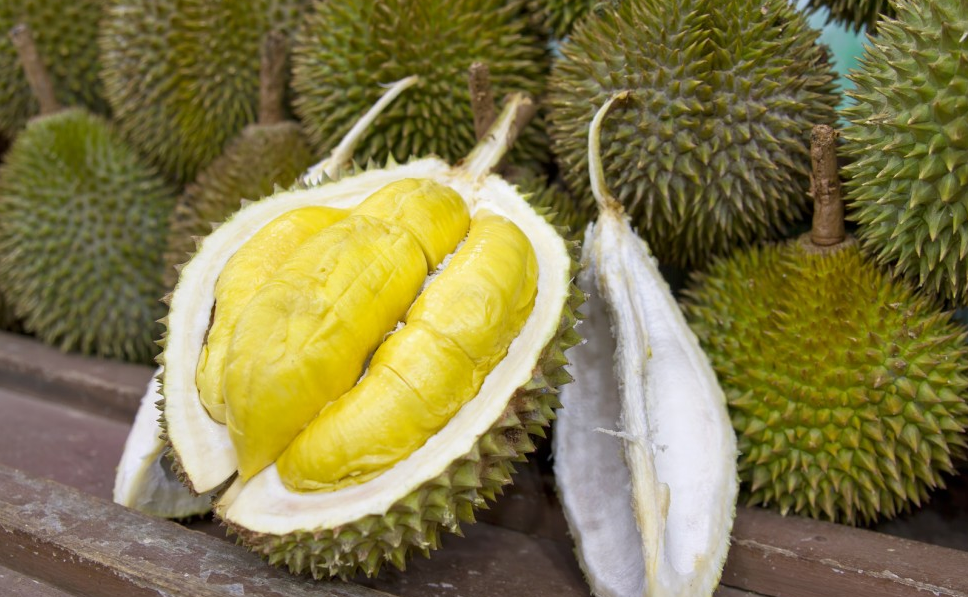(Editor’s Note: Vegan’s love to use Durian as a meat substitute but be careful, they fall from trees and can kill- they are heavy.)
Durian is a unique tropical fruit.
It’s popular in Southeast Asia, where it’s nicknamed “the king of fruits.”
Durian is actually very high in nutrients, containing much more than most other fruits.
However, it is also highly controversial because of its strong smell.
What Is Durian Fruit?
Durian is a tropical fruit distinguished by its large size and spiky, hard outer shell.
It has a smelly, custard-like flesh with large seeds.
There are several varieties, but the most common one is Durio zibethinus.
The fruit’s flesh can range in color. It’s most commonly yellow, white or golden, but can also be red or green.
Durian grows in tropical regions around the world, particularly in the Southeast Asian countries of Malaysia, Indonesia and Thailand.
The fruit can grow up to a foot (30 cm) long and six inches (15 cm) wide. A typical durian fruit has about two cups (473 ml) of edible pulp.
Summary: Durian is a tropical fruit that grows in countries in Southeast Asia. It has a spiky outer shell and a smelly flesh that can vary in color.
How Is It Used?
Durian is used in sweet and savory dishes. Both the creamy flesh and seeds are edible, although the seeds need to be cooked.
The flavor is described as tasting like cheese, almonds, garlic and caramel, all at once.

Here are some of the most common food preparations of durian fruit:
- Juice.
- Angkak, a fermented rice dish.
- Seeds, boiled or roasted.
- Sayur, an Indonesian fish soup.
- Candy, ice cream and other desserts.
- As a vegetable side dish.
It is also used in traditional medicine and has some medicinal properties that are currently being studied.
Summary: Durian is used in many Southeast Asian dishes, both sweet and savory. It’s also used in traditional medicine.
Durian Is Among The Most Nutritious Fruits You Can Eat

Durian is very high in nutrients compared to most fruits.
Here is the nutrient content in a cup (243 grams) of pulp:
- Calories: 357.
- Fat: 13 grams.
- Carbs: 66 grams.
- Fiber: 9 grams.
- Protein: 4 grams.
- Vitamin C: 80% of the RDI.
- Thiamine: 61% of the RDI.
- Manganese: 39% of the RDI.
- Vitamin B6: 38% of the RDI.
- Potassium: 30% of the RDI.
- Riboflavin: 29% of the RDI.
- Copper: 25% of the RDI.
- Folate: 22% of the RDI.
- Magnesium: 18% of the RDI.
- Niacin: 13% of the RDI.
This nutrient profile is actually very impressive compared to other fruits. It makes durian one of the most nutritious fruits on earth.
It is also rich in healthy plant compounds, including anthocyanins, carotenoids, polyphenols and flavonoids. Many of these function as antioxidants.
Summary: Durian is a very nutritious fruit rich in fiber, B-vitamins, vitamin C and various healthy plant compounds.
Health Benefits of Durian
All parts of the durian plant — leaves, husk, roots and fruit — have been used in traditional Malaysian medicine to treat a variety of illnesses, including high fever, jaundice and skin conditions.
Studies have shown that durian fruit may have the following health benefits:
- Reduce cancer risk. Its antioxidants may neutralize cancer-promoting free radicals. In one study, durian extract prevented a strain of breast cancer cells from spreading.
- Prevent heart disease. Several compounds in durian may help lower cholesterol levels and decrease the risk of atherosclerosis, or the hardening of the arteries.
- Fight infection. The rind contains antibacterial and anti-yeast properties.
- Lower blood sugar. Durian has a lower glycemic index than other tropical fruits, meaning it may lead to a lower blood sugar spike. It may also prevent some glucose from being absorbed and stimulate insulin to be released.
While these studies show promise, many of them have been done on animals or in test tubes. The health benefits of durian need to be studied in humans.
Summary: Durian contains nutrients and plant compounds that may provide it with several health benefits, including for cancer, heart health, infections and blood sugar control.
Potentially Toxic Combined with Alcohol
Consuming durian at the same time as alcohol can cause problems.
It’s thought that the sulfur-like compounds in durian may prevent certain enzymes from breaking down alcohol, causing increased alcohol levels in the blood.
This could lead to symptoms such as nausea, vomiting and heart palpitations, according to some studies.
To be safe, avoid eating durian and drinking alcohol at the same time.
Summary: Durian contains compounds that may prevent alcohol from being fully metabolized, causing symptoms such as nausea and vomiting.
How to Eat Durian

Opening a durian’s hard, spiky shell often requires gloves or mitts to protect your hands. This video shows how to open the fruit and remove and use the flesh inside.
Essentially, you need to cut the shell with a knife and then pry it open with your hands. Then, gently remove the sections of durian flesh.
You can then eat it fresh on its own, paired with sticky rice or in a recipe. You can find many recipes on this page.
The flesh is also sold frozen, which slightly changes the texture, making it looser and more stringy.
You can also find durian in prepared foods, such as candy. Yet while that might give you a sample of durian’s flavor, it won’t give you the health benefits.
Summary: You can buy fresh or frozen durian and eat it directly or combined with other ingredients in recipes.
Why Does It Smell So Bad?

Opinions are mixed about durian’s smell. Some people love it, others hate it.
The smell is very strong and has been described as a combination of roasted and rotting onion, sulfur, sewage, fruit and honey.
A study analyzed the aromatic compounds in durian and found 44 active compounds, including ones that contribute to scents of skunk, caramel, rotten egg, fruit and soup seasoning.
So potent is the fruit’s smell that it’s forbidden from many hotel rooms and public transport systems in Southeast Asia.
Your impression of the fruit depends on whether you smell the sweet-smelling or stinky compounds more strongly.
Summary: Durian contains aromatic compounds that give it a strong smell. Some people enjoy the smell, others hate it.
The Bottom Line
Durian fruit is incredibly high in healthy nutrients. These include B-vitamins, vitamin C, minerals, plant compounds, healthy fats and fiber.
However, the smell and taste are definitely not for everyone.
*Article originally appeared on Authority Nutrition.












